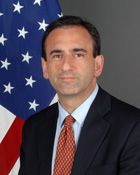
Philip Gordon
Photo from Wikimedia Commons / Author of Photo: U.S. State DepartmentOverview
* Held key positions in the administrations of Presidents Bill Clinton and Barack Obama
* Sides with Israel’s enemies
* Accuses Israel of “racism” towards the Palestinians
* Declared that Israeli “settlements” in the West Bank were “illegitimate”
Born in 1962, Philip Gordon holds a BA degree from Ohio University as well as an MA and Ph.D. in international relations from the Johns Hopkins University School of Advanced International Studies. After completing his education, Gordon served as a Senior Fellow at the International Institute for Strategic Studies in London; Director for European Affairs at the U.S. National Security Council under President Bill Clinton; a Senior Fellow at the Brookings Institution in Washington, DC (1999-2009); and a senior foreign policy advisor to the 2008 presidential campaign of then-Senator Barack Obama. In May 2009, Gordon joined the Obama administration as Assistant Secretary of State for European and Eurasian Affairs. Nearly four years later—on March 11, 2013—he became Special Assistant to the President and White House Coordinator for the Middle East, North Africa, and the Gulf Region. At that time, National Security Advisor Tom Donilon praised Gordon as someone who theretofore had been “indispensable in helping us to formulate policy and address issues around the globe, including Libya, Syria and Iran.”
On July 9, 2014 in Tel Aviv, Gordon made headlines when he delivered the keynote address at the Haaretz Conference on Peace—a speech described by The Times of Israel as “a blistering attack on Israeli foreign policy.” Earlier that day, and throughout the preceding several days as well, Hamas and Islamic Jihad terrorists had been busy launching hundreds of rockets from Gaza into a number of Israeli cities—including Tel Aviv—setting off air-raid sirens and driving millions of residents into bomb shelters.
Against this backdrop, Gordon appealed to Israeli and Palestinian leaders to make the compromises necessary for a permanent peace agreement. He stated, for example, that Israel’s government in Jerusalem “should not take for granted” the “opportunity” it had to negotiate such a treaty with Palestinian Authority President Mahmoud Abbas, “who has shown time and again that he is committed to nonviolence and coexistence with Israel.” “While walls and missile defense systems can help protect against some threats,” Gordon expanded, “true safety for both sides will only come with a comprehensive negotiated settlement” resulting in the creation of “two states” with “permanent” borders “based on the 1967 lines with mutually agreed swaps.”
Echoing Secretary of State John Kerry‘s and President Obama’s previously articulated assertions that Israel would find itself increasingly isolated by the international community if it failed to make peace with the Palestinians, Gordon drew a moral equivalence between the two warring parties: “[W]e have no interest in a blame game. The unfortunate reality is that neither side prepared their publics or proved ready to make the difficult decisions required for an agreement. And trust has been eroded on both sides. Until it is restored, neither side will likely be ready to take risks for peace, even if they live with the dire consequences that resolve from its absence.” “[T]here has clearly been far too much recrimination and some reprehensible examples of racism on both sides,” Gordon added.
Moreover, Gordon lectured Israel on its duty to “confront” the “undeniable reality” that “it cannot maintain military control of another people indefinitely”; that “doing so is not only wrong but a recipe for resentment and recurring instability”; and that such a course of action “will embolden extremists on both sides, tear at Israel’s democratic fabric, and feed mutual dehumanization.”
Building upon that theme, Gordon reiterated the Obama administration’s position that Israeli “settlements” in the West Bank were “illegitimate and an impediment to progress on peace negotiations.” “Just as Israelis built a state in their homeland,” he explained, “Palestinians have a right to be a sovereign, free, and secure people in their own land” as well, and to thereby “reach their full potential.”
Gordon also said that the U.S., as an ally of Israel, had some basic, yet difficult, questions for the Jewish state: “How will Israel remain democratic and Jewish if it attempts to govern the millions of Palestinian Arabs who live in the West Bank? How will it have peace if it’s unwilling to delineate a border, end the occupation and allow for Palestinian sovereignty, security and dignity? How will we prevent other states from supporting Palestinian efforts in international bodies, if Israel is not seen as committed to peace?”